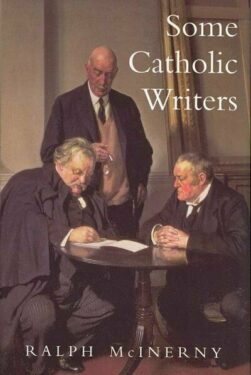Fourth and last in a series

As I was reflecting on how to end this series of columns in which I have tried to use the novels and essays of Walker Percy (1916-1990) to provoke thought about the mystery of the human person, I spotted in my bookcase a book that I had read and enjoyed many years ago. It was Ralph McInerny’s “Some Catholic Writers” (St. Augustine’s Press, 2007). In his book, McInerny offers over 35 short essays on Catholic writers. McInerny in his short essays offers some excellent insights into the authors. Among others, he discusses Georges Bernanos, Francois Mauriac, Graham Greene, G. K. Chesterton, James Joyce and Jacques Maritain. When I took the book from the bookcase I immediately looked at the essay on Walker Percy. Commenting on Percy’s fifth novel, “The Second Coming,” McInerny wrote:
“ ‘The Second Coming’ (1980) made clear the technique Percy had evolved to make his increasingly overt Catholic sensibility palatable to a wide range of readers. The hero escapes from a mental institution, descends into a cave in search of a proof for the existence of God and a sign of the apocalypse. Are we to think of those Christ haunted crazies of Flannery O’Connor’s whom she saw as what happens when Christianity becomes unmoored from the Church? Not quite.
“Percy had come to see that seriously to believe the Christian message nowadays is to qualify as insane. The trick then is to accept the judgment and to show from the vantage point of this putative insanity the genuine insanity of the standpoint from which the Christian is seen as crazy” (pp. 122-123).
Both Percy and Flannery O’Connor claimed when a contemporary storyteller told a story with a religious message, the author was taking a chance because society had become so secular, readers would miss the religious dimension of the story. I have seen that happen more than once. Occasionally even the critics miss the message. One of the most discouraging examples I can think of involves Evelyn Waugh’s masterpiece “Brideshead Revisited.” There was an 11-part series on television dramatizing the novel that was the best series I have ever seen on television. There was also a feature film version that played in theatres years after the television series. I once met the star of the series, Jeremy Irons, and I congratulated him on what a magnificent production it was. He asked me, “Did we get the religious part right?” I assured him that the production beautifully captured Waugh’s Catholic vision. Irons was delighted and said, “We tried very hard.” The version that played in theatres was incredibly bad. Its creators missed the religious dimension of Waugh’s novel completely.
Thinking about how secular contemporary society has become, I realize how much I miss a voice like Percy’s. He was a prophet who unashamedly presented his Catholic faith in his writings and was so talented that even many who did not share his faith knew he was an author who had to be taken seriously. A medical doctor who never practiced medicine, Walker chose as his vocation the writing of novels and essays to present a vision that he saw as an important response to society’s ills. Perhaps there are many people who try to present religious vision as a response to the evils in the world. What I find special about Walker is that he had both the talent and the courage to get the attention and even the admiration of many without ever compromising about what he took to be the truth.
McInerny writes the following about Percy’s “The Thanatos Syndrome” (Farrar, Straus & Giroux, 1987):
“The last novel picks up and extends Percy’s concern with the tendency to regard human beings as things to be altered, manipulated and controlled by drugs and oppressive psychological techniques. In danger of being lost is the free and responsible agent, wounded by sin, capable of salvation, who is the concern of Christ’s salvific act. A recognition of the human capacity for evil, as a consequence of freedom, is a presupposition for salvation” (p. 123).
I am going to end this series with some of the closing words of McInerny’s book, because they summarize what I have been trying to say in this series of four columns:
“Indeed, we are mysteries to ourselves…Novels are books deliberately written in quest of the wonder of the human person whose life is invariably a mixture of the intended and unintended but with the suggestion of a pattern of whose meaning we are never quite sure. For most of us, it is this realization that makes us aware of the hand of God in our lives.
“The poet, the novelist, the saint above all, remind us how little our fate is in our hands” (p. 154).
Father Lauder is a philosophy professor at St. John’s University, Jamaica. He presents two 15-minute talks from his lecture series on the Catholic Novel, every Tuesday at 9 p.m. on NET-TV.
